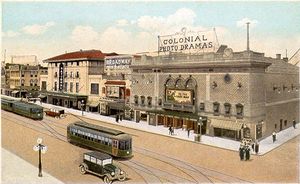Commercially Viable Streetcar: Difference between revisions
From ETHW
No edit summary |
No edit summary |
||
| Line 2: | Line 2: | ||
<p>Richmond, Virginia. [[Frank J. Sprague|Julian Sprague]] completed the 17 mile Richmond [[Sprague: Commercial Streetcar|street car]] system in February 1888, the first in the US. It became the prototype for electric street railways because of its large-scale practicality and operating superiority. </p> | <p>Richmond, Virginia. [[Frank J. Sprague|Julian Sprague]] completed the 17 mile Richmond [[Sprague: Commercial Streetcar|street car]] system in February 1888, the first in the US. It became the prototype for electric street railways because of its large-scale practicality and operating superiority. </p> | ||
<p>[[Image:Streetcar.jpg|thumb|center|Postcard view of "Theatrical District, Broad Street, Richmond, Virginia", A historic postcard showing electric-powered trolley streetcars in Richmond, Virginia, the city where Frank J. Sprague successfully demonstrated his new system on the hills in 1888. Of course the streetcars shown here are those of two generations later, of the type mass produced and seen in cities throughout North America.]]</p> | |||
<p></p> | |||
<p>[[Category:Transportation]] [[Category:Land_transportation]] [[Category:Road_transportation]]</p> | <p>[[Category:Transportation]] [[Category:Land_transportation]] [[Category:Road_transportation]]</p> | ||
Revision as of 18:56, 14 July 2010
This article is a stub. You can help the GHN by expanding it.
Richmond, Virginia. Julian Sprague completed the 17 mile Richmond street car system in February 1888, the first in the US. It became the prototype for electric street railways because of its large-scale practicality and operating superiority.

Postcard view of "Theatrical District, Broad Street, Richmond, Virginia", A historic postcard showing electric-powered trolley streetcars in Richmond, Virginia, the city where Frank J. Sprague successfully demonstrated his new system on the hills in 1888. Of course the streetcars shown here are those of two generations later, of the type mass produced and seen in cities throughout North America.